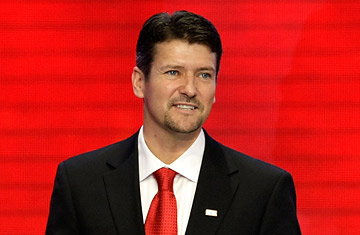
Todd Palin
In the end, the First Dude wasn't the only no-show. The five other witnesses who had been subpoenaed with Todd Palin were also, as expected, missing from the Alaska Senate Judiciary Committee's hearing into the so-called Troopergate scandal. In fact, the committee itself didn't even show up. Twenty minutes after the 10 a.m. scheduled start time, the second-floor conference room of the utilitarian Legislative Information Offices building in downtown Anchorage still had nothing but bystanders: a few legislative aides and two dozen or so journalists who sipped coffee, traded business cards and wondered exactly what there would be to see.
The action finally came in the form of Senator Hollis French, the Anchorage Democrat who is leading the investigation into whether Governor Sarah Palin abused the power of her office to get her little sister's ex-husband, state trooper Mike Wooten, fired by pressuring — and then dismissing — Commissioner of Public Safety Walt Monegan. French has been the focal point of the McCain campaign's objections to the Troopergate investigation. They say French, as a Democrat, has a partisan ax to grind. And while the mostly Republican committee had voted unanimously to start the investigation before Palin was on the McCain ticket, French, the committee chair, did make some incautious statements to the media weeks ago, suggesting the committee's findings might be an "October surprise" or even grounds for impeaching Palin.
So French was on his best behavior here. He read from a prepared statement and took no questions. His statement warned that the six people who had received subpoenas and did not show, including Todd Palin, may be held in contempt by the legislature (he didn't mention, though, that the legislature won't be in session to do that until next January). And he explained that seven other witnesses, who have said through lawyers that they too will not appear, weren't given subpoenas because the investigator had relied on the word of assistant attorney general Michael Barnhill that they would testify without a subpoena. That cooperation was "abrogated," said French, who called the investigator's reliance on an informal agreement "regrettable."
Regret was certainly the order of the day for both sides. Just as French must have regretted giving his opponents ammo by seeming to take sides, Sarah Palin may be regretting her earlier command to Alaska voters to "hold her accountable." Troopergate has quickly devolved into a farce of empty witness chairs and very conventional partisan politics, including the recent involvement of a former New York federal prosecutor (no, not Rudy Giuliani) whom the McCain campaign flew to Alaska to tidy up the mess. His name is Ed O'Callaghan, and his main tactic seems to be to stall the investigation as much as possible. He said that Todd Palin submitted "objections" to the subpoena that needed to be answered before he would take the stand. Another lawyer for the Palins has said that Todd was too busy with the campaign to testify, as if standing stage left behind Sarah Palin, holding Trig and grinning during her speeches, were a matter of national security.
There was, however, news from the morning's proceedings: French, at the end of his statement, said that the investigator Steve Branchflower will deliver his findings, as planned, on Oct. 10, regardless of who testifies or doesn't.
A Palin ally, Anchorage Republican Senator Gene Therriault, formed an impromptu spin room after French's statement, telling the cameramen and reporters who crowded around him that Oct. 10 was an "artificial deadline" and that the real question of the investigation was already solved in his mind — Palin had the right to fire Walt Monegan because he was an at-will employee. But the other question is still germane: Did Palin, her staff and her husband pressure Monegan to remove Wooten from the force? There's evidence to suggest they did, starting with Palin's own admission that there were over two dozen contacts between her allies and Public Safety officials about Wooten.
The stonewall-and-stall strategy could pose a danger for Palin, since the findings will likely be the same regardless of whether the staffers — or the First Dude — testify. And all she will have accomplished by not cooperating is to have looked evasive, in contrast to her very effective branding as a proponent of reform and transparency in government.
She and the McCain campaign will have one more chance to cooperate, when the committee issues subpoenas for the remaining seven staffers to come in and testify on Sept. 26. The question is: Will they come in as ordered? Or will that hearing look like this one — no witnesses and all politics as usual?
(See photos of Sarah Palin on the campaign trail here.)
(See Sarah Palin's rise to the Republican ticket here.)
